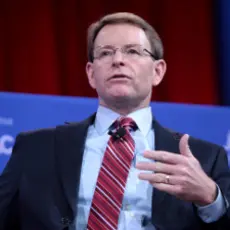Janet Mefferd, one of the leading Christian conservative radio talk show hosts in the country, dedicated part of her show yesterday to discussing the rise of dominionism in conservative politics. Along with her guest, “Christian apologist” Robert Bowman of the Institute for Religious Research, Mefferd expressed her grave concerns about the growing influence of dominionists and their participation in Texas Gov. Rick Perry’s The Response prayer rally. They defined dominionism as the belief that fundamentalist Christians should have control over positions of political power and administer law according to Biblical precepts.
The whole program is worth listening to, as Bowman and Mefferd discuss the New Apostolic Reformation, the Seven Mountains mandate, and Christian Reconstructionism from a conservative point of view.
As we’ve previously noted, many of the leading critics of dominionism are in fact social conservative Christians. But according to Liberty Counsel’s Matt Barber, dominionism is a liberal conspiracy theory akin to Holocaust denial, and even mainstream journalists have dismissed dominionism as nothing but a left-wing scare tactic used against religious politicians.
Throughout the program, Bowman notes that many in the Religious Right have embraced dominion theology even if they don’t refer to themselves as dominionists and Mefferd was concerned about how “longtime, reputable evangelical leaders” have joined forces with avowed dominionists because of their shared panic that they are losing the fight on social issues like marriage and abortion.
Mefferd specifically pointed to The Response as a prayer rally where dominionists were “mainstreamed,” as traditional Religious Right leaders like James Dobson, Don Wildmon and Tony Perkins shared the stage with New Apostolic Reformation leaders like Mike Bickle and Alice Patterson, and the rally’s official endorses included NAR figures C. Peter Wagner, Cindy Jacobs, Che Ahn and John Benefiel.
The two both warned Religious Right against partnering with figures associated with the “off-kilter” dominionist movement, which Mefferd called “a strange turn of events” for the movement:
Mefferd: It seems to me from what I’ve read about the New Apostolic Reformation and dominion theology this is a little bit off-kilter to me. What’s interesting to a lot of evangelicals is seeing this sort of thought being mainstreamed, now you’re seeing gathering with longtime, reputable evangelical leaders, who are not necessarily Pentecostal or subscribe to dominion theology, but they’re joining hands with some of these people to achieve political ends which seems like a strange turn of events.
…
Mefferd: So if Christians go for instance to a prayer rally and there are a lot of dominionist people there, people who are interested in this theology and ascribe to this theology, is there any particular problem with those who don’t subscribe to dominionist theology joining hands, and having a big get together, theologically, if they have a prayer rally together, is there any sort of problem with that?
Bowman: Boy you’re gonna get me in trouble here. First of all, I gotta say that mature and well-meaning Christians can have different point of view on this thing. But my own personal opinion is that I do think it’s a problem. If you’re a Christian who does not subscribe to these neo-Pentecostal, fringe ideas about apostles and prophets being restored to the Church in the Last Days to establish a Kingdom of God movement before the Second Coming of Christ, mixed in with all the Word of Faith, health-and-wealth gospel stuff.
If you don’t agree with that, and of course I don’t, then participating in rallies and conferences and conventions where these teachers and leaders of that movement play a prominent role, I’m not just saying they happen to be there along with other people, but if they are playing a prominent role in one of these activities, then I think participating in that lends credence and support to that particular movement. And I find that personally troubling, I wouldn’t want to do that.
Mefferd: I think that’s very well stated and I think it’s very fair. You ought to know what you’re getting into. I think no matter what you’re joining in, if you’re going to a conference, going to a revival meeting, going to a prayer rally, I think it always benefits you to know exactly who the organizer is, what they believe, and then you can discern whether or not it’s something you really want to participate in.





